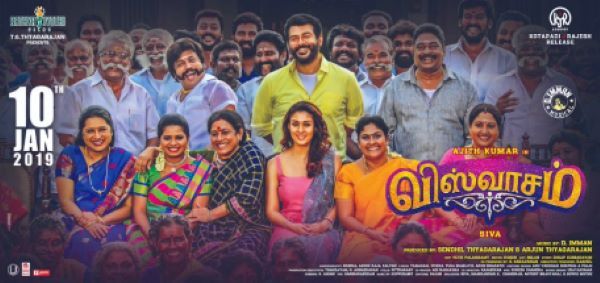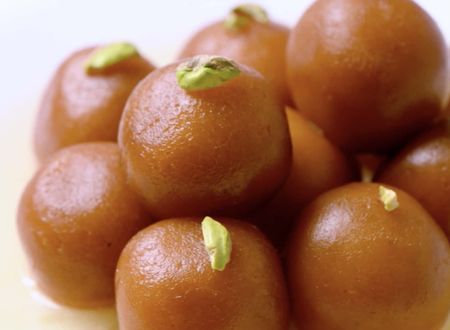Spoiler Alert: This article discusses the plot of the Tamil Movie Viswasam.
My wife and I decided to celebrate our anniversary in 2019 with a movie and a dinner. We decided to dine at Amethyst, which provides a nice nature-filled ambiance, and were choosing between two movies that released on Pongal – The Rajnikanth starrer Petta, and Ajit starrer Viswasam. My wife had a slight preference towards Petta, I had a stronger preference towards Viswasam (I loved the previous three movies of the director Siva and Ajit – Veeram, Vedalam and Vivegam). While we were both open to either choice, my stronger preference meant we would be watching Viswasam.
I found the first quarter of the movie relatively boring. We were told that Ajit, who was a respectable bigwig in his village, had been estranged from his wife Nayantara for 10 years. There was a festival that was coming up, which occurs once in 10 years, and Ajit could not head the festival if his wife was not present. His well-wishers persuade him to make the trip to Mumbai, to persuade him to bring his wife back for the festival. During the train ride to Mumbai, we are given a glimpse into their flash back.
10 years ago, Ajit, while still respected in his village as the owner of a rice mill, was not averse to getting into fights to resolve situations. Nayantara, a medical doctor from Mumbai, whose father owns a pharmaceutical company, comes to Ajit’s village to conduct a medical camp. Witnessing Ajit’s penchant for a fight, she believes him to be a ruffian, and even lodges a police complaint against him. Soon after, she gets to see Ajit’s kind heart beneath his rough edges. Ajit, in turn, admires Nayantara’s gumption. Though Nayantara returns to Mumbai soon after her medical camp gets over, she comes back to the village, wishing to marry Ajit. Though the most unlikely of couples, he being an illiterate villager and she being a sophisticated doctor, they get married.
The love and respect they show each other is heartwarming. Nayantara embraces the village life wholeheartedly and becomes one of the village people. Ajit gives his wife the space she wants and go to Mumbai to manage her father’s pharmaceutical company. Nayantara watches in silent amusement as Ajit continues to bash up people. Ajit showers her with love. Nayantara eschews an opportunity to go to Stanford to pursue higher studies when she realizes that she is pregnant. All in all, a picture-perfect couple, who are soon blessed with a delightful baby girl.
While the couple showers love on the baby-girl, the rough edges of Ajit now start bothering Nayantara when he holds his kid in one hand and fights with the other hand – she strongly objects to his jeopardizing his kid. One day, when she is coming back from Mumbai to the village, Ajit and the kid go to pick up Mommy. On the way, Ajit’s enemies pick up a fight with him, and though Ajit pleads that they not fight when his kid is present, the villains do not listen, and Ajit’s daughter gets injured. Nayantara is shocked to see their daughter hurt, and the couple spends tense moments as the doctors treat the kid. The kid, thankfully, is out of danger, but Nayantara doesn’t want her daughter’s safety jeopardized going forward, and makes the decision to live alone with her daughter in Mumbai, and a crestfallen Ajit has no choice but to acquiesce. He is devastated. So am I.
At this point, I end up sharing the heavy heart of both Ajit and Nayantara. Ajit – for no real fault of his other than paying a price for his earlier penchant for the fight, ends up losing his wife and kid. Nayantara’s actions are also justified, for a mother’s love is unparalleled. I am now brought back from the flashback to the present moment. Nayantara refuses to give Ajit the time of the day, but as he is ready to go back to his village, his daughter is attacked by villains, and Ajit steps in to save her. He offers Nayantara that he stay back to protect his daughter – as a driver, not as a husband/father. Ajit is happy to be in his daughter’s presence. So am I.
Now, the kid is a runner, and Ajit drives her to her practice sessions. “How do you run so fast?”, Ajit asks her after the completion of a training session. “It is all thanks to my father”, she replies. Ajit’s heart wells up with happiness. So does mine. “My coach told me to think of someone I hate, and imagine that I am trampling over them. I hate my father. He may have problems with my mother – why doesn’t he see me?”, she rants, crushing Ajit’s heart. And mine. A beaten Ajit can’t bear it any more, and steps out of the car, into the rain, his eyes filled with tears. My eyes too are filled with tears. The Kannana Kanne song that follows does me no favours in stopping my tears – it serves to increases them multifold.
The rest of the movie continues to be a roller coaster of emotions, and I experience all the emotions with Ajit – when he dances in happiness, I too dance mentally in happiness, when he experiences supreme exhilaration at the end upon reconciling with his family, so do I. So do I. At the end of the movie, we have two separate experiences – my wife thought this was a meh movie at best, while I was transported into a new world. This is not the end of the story. A few days later, we went to Bengaluru to attend the housewarming ceremony of my cousin. We had an extra day on our schedule, my wife went to a Lakme salon, which would take a few hours. No problem. I checked out which theater was playing Viswasam, and watched this movie a second time, this time having the luxury of being alone, so that I needn’t worry about my tears quotient. And I went through the roller-coaster emotions this time as well.
My friends, this is not the end of the story. A month later, my wife and I were in Pune at my in-laws’ place. Viswasam was releasing on Amazon Prime. I made my wife watch it for a second time, and my in-laws watch it as well. My poor wife had to endure the movie again, my in-laws thought it was a decent watch, I enjoyed the movie thoroughly again. I came back to Chennai. Now, you may ask, if a theater is running a movie after it is released on an OTT platform (or TV), who would go to the theater and watch the movie? Moi, mon ami, Moi. I watched this movie for a fourth time, this time without all the tears, but still transported into the world of Ajit and Nayantara.
Now, what is the point of this article? I knew that I was entering into a make believe world, and it felt so real. Not once, but four times. Upon reflection, there had to be a reason why I went through this experience. It was a simulation of samsara, a mini-samsara if you will. The scriptures tell me that this world is just an extended dream, but I don’t feel it. It surely feels real to me, and the explanation that it is an extended dream is conceptual, intellectual at best. Having gone through this mini-samsara experience with Viswasam opens me to the possibility that though I don’t see the world as an extended dream, I have to trust the scriptures and look to come out of this dream. Thank you Viswasam, for an uber-useful simulation of samsara (and of course for delightful movie experiences).
P.S. Kannana Kanne has become my go-to lullaby to make my toddler sleep.
Image Credit: https://www.moviebuff.com









Comments & Discussion
2 COMMENTS
Please login to read members' comments and participate in the discussion.